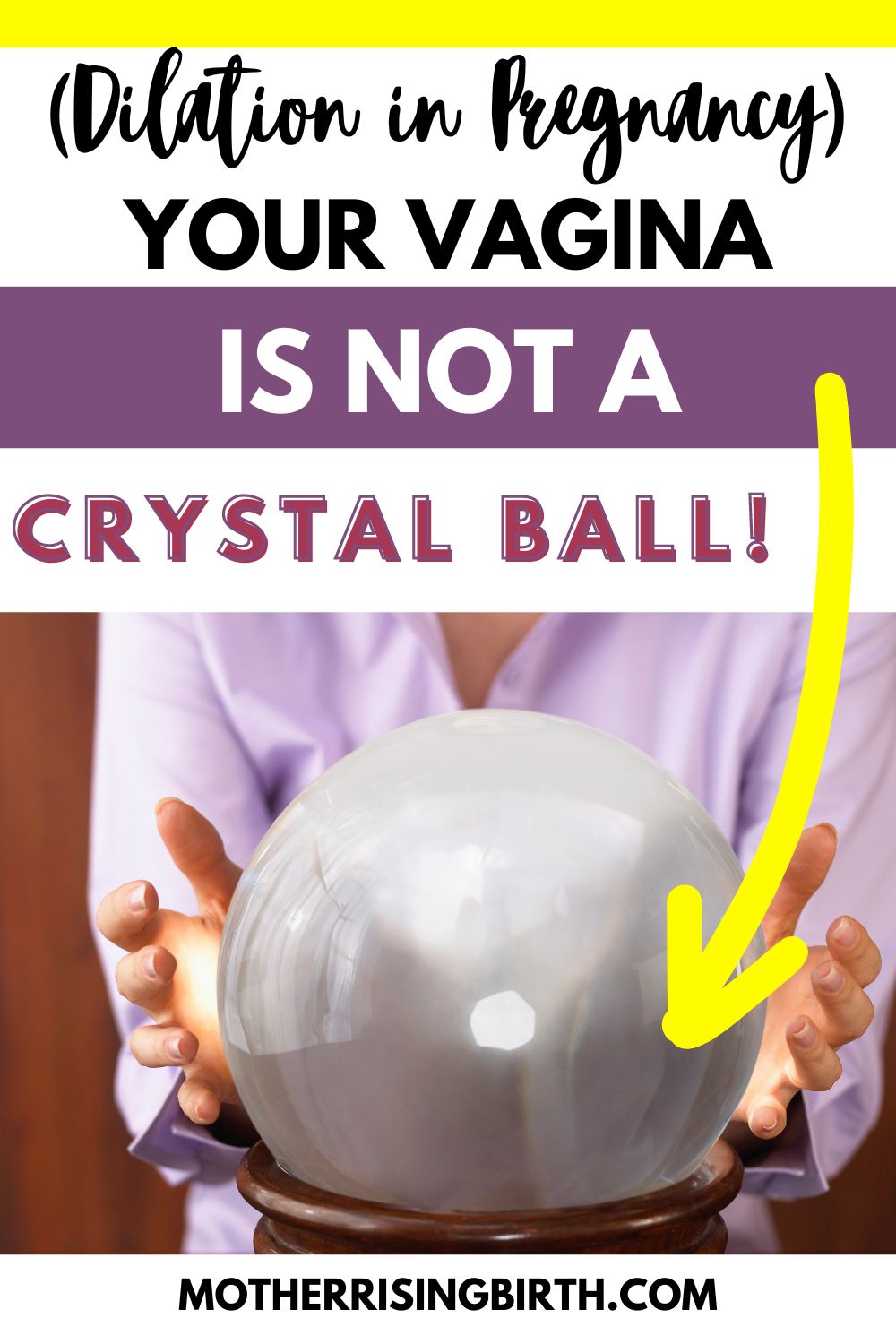Dilation in pregnancy (or lack there of) can be confusing to new parents. Cervical dilation happens when the cervix, which is the opening of the uterus, slowly opens. It can be normal for the cervix to start opening during the last part of the third trimester, but it can also be normal for it to stay closed. Either way, in this article we will learn what dilation in pregnancy before and during labor means.

No Vaginal Exams!
When I was pregnant with my first child, I swore up and down that when I got closer to my due date I was not going to ask to know my dilation in pregnancy. I knew that by having a vaginal check I would be tempted to start prophesying about when my labor would start and what my birth would be like. For example, if I found I was dilated to 2 cm around 38 weeks I could easily think that I would go into labor before I reached 40 weeks. Or that 20% of my labor was behind me. 😉
Yes Vaginal Exams!
Of course, I had no self-control and I asked for vaginal checks starting at 35 weeks. I found out I was 2-3 cm dilated and 40% effaced. Finding this out was fascinating!
At the same time, I started to understand how knowing this sort of information could also be problematic. I could have easily started stressing and wondering if I would go into labor before my due date. I could have got really self-confident and assumed my labor would be shorter because I was already 1/3 done dilating. But I didn’t do any of those things because I knew that my vagina was not a crystal ball.
I repeat – The vagina is not a crystal ball!
Dilation in Pregnancy
Dilation, effacement, and station information in pregnancy does not predict when labor will start, how long labor will be, or how easy or difficult it will be.
The only thing vaginal checks tell us is what our bodies have done to prepare for birth, if anything.
If you opt for a vaginal check at a prenatal appointment and find out that you aren’t dilated at all – you could have your baby that night. Or a week later. Who knows!
If you find out you are 4-5 cm dilated at 38 weeks pregnant you could have your baby tomorrow… or two weeks later. We just don’t know.
Dilation in Labor
The same can be said about dilation in labor. The only thing that dilation, effacement, and station information in labor tells us is what our bodies have already done. A vaginal exam in labor will not tell us how much longer labor will be!
Labor math does not exist.…
… and we so badly want it to! For example, if it took us 4 hours to get to 4 cm dilation it’s logical to conclude that it’ll take us 6 more hours to get to 10 cm (which is when the cervix is fully dilated and ready to push). This is linear thinking, but the thing is – birth just isn’t linear! So remember, labor math simply doesn’t work and it’s the opposite of helpful.
Seriously!
Seriously, vaginas are not crystal balls. Your vagina will not tell you how long you have to go until you push your baby out. Even once you get to 10 cm and start pushing you still have no idea how long it will take. It could be 10 minutes, an hour, or even longer! (The average first time mom takes around 90 minutes to push their baby out.)
A Disservice
Stepping into the unknown is the nature of labor, birth, and being a parent. Care providers do a disservice to parents by prophesying when their baby will arrive. I hear about it all the time! But, I can understand why it is done – because it is HARD to sit in the unknown with an expecting mama and to not know with her.
However, I think care providers should censor birth predictions because it is much more compassionate to hold the space for parents while they step into the unknown than to predict the future.

Want More?
If you found this post helpful, you might be interested in this post on how to check your own cervix, this one about how your vagina is not a vacuum cleaner, or this one about how your vagina is not a steel pipe.

Amanda
Saturday 18th of February 2017
When I asked to be checked at 36 5/7, my doctor said she couldn't even find my cervix because it was so far up still (or back) either way I figured that meant I must not be close to anything happening. 18 hours later we had our baby boy in our arms by VBAC. My water broke about 12 hours after I heard the news, she couldn't find my cervix. Just goes to show you...exactly what your "number 1 thing to know about your vagina" is all about.
Jessica
Thursday 8th of December 2016
True!! I just had my 2nd child 2 weeks ago. At my 40 week appointment I had not dialated AT ALL. And this really discouraged me!! He ended up coming at 41 weeks 2 days...after a 25 hour long natural labor during which i was stuck at 7cm for at least 10 hours. Which definitely REALLY discouraged me. Every time they'd check and there was no change I'd burst into sobs. But as soon as my body started progressing, it happened very quickly.
Ella
Wednesday 9th of March 2016
Too funny, I'm so glad I didn't get checked before the hospital! I was 0.5cm when I showed up a the hospital with broken waters. I think I had a check at 2cm, 3cm, 6cm, 7cm, 10cm, and 10cm and +2 (over 27 hours). I wish I had the brain power left to turn down more checks because we both ended up with infection ("prolonged" labor and many checks). Oh well, I know better for next time.
Eva
Friday 11th of September 2015
I had preeclampsia, so for me, the vaginal check was helpful: The midwifes were of the view that my health was such that an induction (at 39-40 weeks) was possibly the safest. I pushed back and had them wait, do more tests on how bad my preeclampsia was (initially it was borderline). So to see that from one appointment to the next (3 days apart), I dilated from 1cm to 2.5 cm, and effaced from 60% to 75% gave me peace of mind that perhaps my body would indeed respond to a mild induction (cervadil) and I agreed to it. This was on the eve of the 'due date', and indeed, my body responded and I was able to have a healthy, natural delivery without any other interventions.
Since I delivered with midwifes in a hospital setting, I don't recall right now if they did additional vaginal checks on me. I think they didn't, because they could see how I was progressing based on my breathing, contractions, etc... and I was also allowed to move as I felt comfortable and eat (although I didn't feel like it).
Nicole
Friday 17th of April 2015
Did not have even one vaginal check with my third labor. It was wonderful!!!